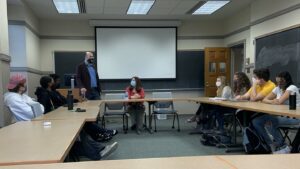Inner Journey to Shared Art
By Stephen Wilson
The COVID-19 pandemic altered the routines of our lives. For musicians and theater artists there were no longer stages for performance. The curtain dropped.
For acclaimed pianist Simone Dinnerstein, who’s been playing since age 7, the grueling travel schedule and disciplined hours dedicated to practice stopped. There were no pending performances, no new music to learn, and the role of art in the wake of global disease seemed questionable.
She rose from that state as composer Richard Danielpour created a suite of 15 movements, each dedicated to a different group impacted by the pandemic. Danielpour wanted Dinnerstein to record the work after relying on her performance of Bach’s Goldberg Variations to help him navigate COVID-19 isolation.
Flash back to 2017 when Dinnerstein was on stage at the Williams Center for the Arts to perform that same work of Bach. It was a multi-artist production—dancers under the direction of choreographer Pam Tanowitz joined Dinnerstein’s piano to bring together the interplay of rhythm and emotion.
During that visit, Dinnerstein made a stop to an English class taught by Prof. Chris Phillip to discuss spirituality. Students in the course were exploring big questions and concepts like beginner’s mind through reading, writing, and listening. Hearing from an artist like Dinnerstein who took something well known and made it fresh might help students who hunger for new ways of seeing.

Dinnerstein returned to campus in October and again stopped by Phillips’ Spiritual Writing class. She discussed recent work—both Danielpour’s “American Mosaic” and a multi-media interpretation of Charles Ives’ “Piano Sonata No. 2,” which she recently premiered at Montclair State University.
In the class, she discussed music, performances, the pandemic, and creating art.
“The course has us listen first, both in class with a minute of silence and in our assignments,” says Phillips. “We use silence to help us become present to ourselves and others. The second half of the course has us thinking outward, turning to the world that needs our care, both in relationships and issues.”
The Zoom-induced isolation we all experienced may yield something amazing. Dinnerstein discussed how uncertain times may help us find something we didn’t know we had, that something surprising usually happens when we face the problems before us.